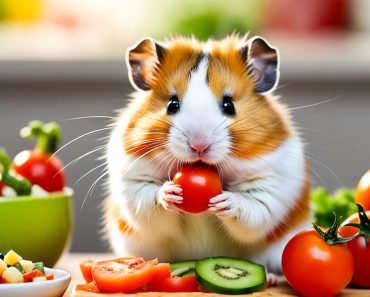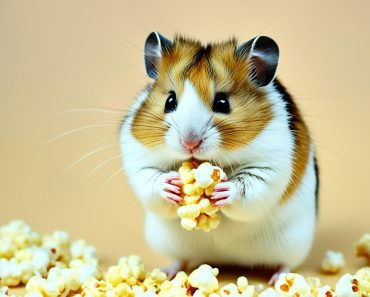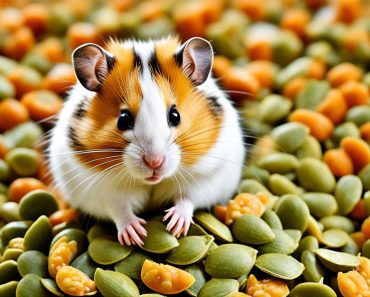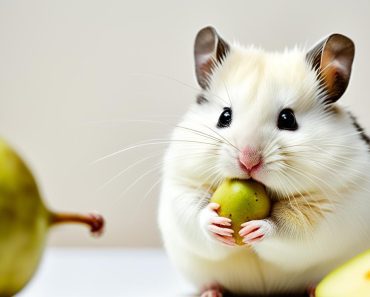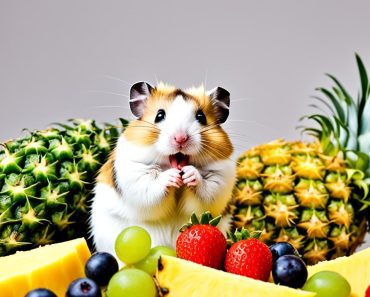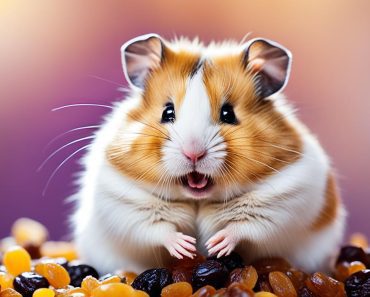As a hamster owner, you want to ensure that your furry friend has a healthy and balanced diet. One common question that hamster owners often ask is: can hamsters eat guinea pig food? Let’s explore this topic and find out what’s best for your hamster’s nutrition.
Hamsters are omnivores and have a diverse range of food options. They can enjoy a variety of seeds, vegetables, and fruits. On the other hand, guinea pigs are herbivores and have specific dietary needs. While there are differing opinions on whether hamsters can eat guinea pig food, it is generally recommended to stick to food mixtures made exclusively for hamsters.
Commercial guinea pig food may not provide the essential nutrients that hamsters require. The nutritional requirements of hamsters differ from those of guinea pigs. Feeding hamsters guinea pig food on a regular basis can lead to nutritional deficiencies and health problems. Therefore, it’s best to opt for food mixtures specifically designed for hamsters to ensure that they receive the optimal nutrition they need.
Can Hamsters Eat Guinea Pig Food? Yes, but it is not recommended.
- Hamsters are omnivores and have a variety of food options.
- Guinea pigs are herbivores and have different dietary needs compared to hamsters.
- Feeding hamsters guinea pig food may result in nutritional deficiencies.
- It is recommended to feed hamsters food mixtures made specifically for them.
- Consulting a veterinarian is important for proper hamster nutrition and feeding guidance.
Hamsters’ Dietary Preferences
As an omnivorous species, hamsters have specific preferences when it comes to their diet. They enjoy a variety of seeds and vegetable roots, which provide them with essential nutrients and energy. Additionally, hamsters can have fruits like apples and bananas in moderation, which adds flavor and variety to their meals.
In pet shops, you can find commercial food mixtures specially designed for hamsters. These mixtures ensure that your furry friend receives a balanced diet. However, if you prefer a more personalized approach, you can also create homemade hamster food by selecting high-quality seeds and grains.
Proper hydration is vital for hamsters, so make sure to provide them with fresh and clean water at all times. Additionally, including a scrap of wood in their habitat is beneficial as it helps keep their teeth in good shape by chewing on it.
While hamsters can tolerate small amounts of food containing sugar, it’s best to avoid feeding them large quantities. Sugar can lead to health issues, so it’s important to monitor their intake. A recommended guideline is to provide around 20 grams of food per feeding or one tablespoon to ensure they receive the right amount of nutrients.
It’s important to observe your hamster’s eating habits. If they don’t finish the food within a reasonable time, remove it and provide fresh food the next day. This ensures that your hamster always has access to fresh and nutritious meals.
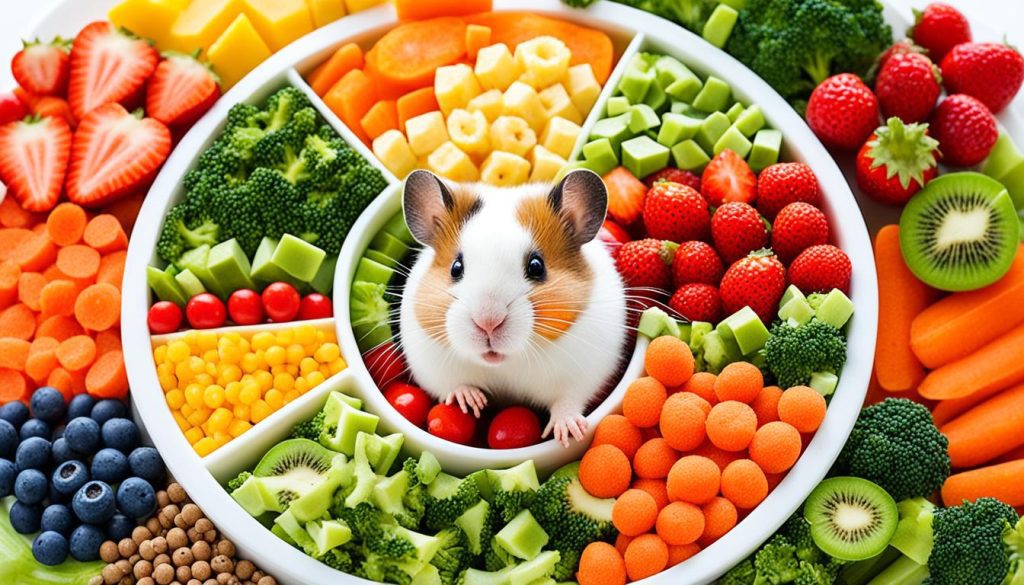
Guinea Pig Diet
Guinea pigs are exclusively herbivores and require a diet that consists of a large amount of vegetables. Their menu includes lettuce, chard, peppers, zucchini, cucumber, tomato, green beans, and more.
However, it’s important to be cautious with some vegetables due to their calcium content. Vegetables such as parsley and spinach should be given in moderation. Carrots should also be given in limited quantities because of their sugar level.
To ensure a well-rounded diet, it’s essential to feed guinea pigs commercial food specifically formulated for their dietary needs. These commercial food products provide the necessary nutrients to support their overall health. Additionally, it’s important to supplement their diet with several servings of fresh fruits and vegetables per week.
Guinea pigs can also enjoy eating grass, but it should be free from toxins and traffic pollutants to ensure their well-being.
Why Hamsters Should Not Eat Guinea Pig Food
Hamsters and guinea pigs have different dietary requirements. While guinea pigs are herbivores and thrive on a diet primarily consisting of vegetables, hamsters are omnivores and need a combination of seeds, grains, and protein-rich foods to meet their nutritional needs.
Feeding hamsters guinea pig food can lead to various health problems and nutrient deficiencies. One of the main concerns is the lack of protein in guinea pig food, which is essential for hamsters’ growth, muscle development, and overall health. Protein deficiency in hamsters can result in a weakened immune system, dull and brittle fur, and delayed healing of wounds.
Moreover, guinea pig food may not provide enough fiber for hamsters. Adequate fiber intake is crucial for hamsters to maintain proper digestive health and prevent issues like constipation and diarrhea.
Another important nutrient that hamsters require is vitamin E, which helps protect their cells from damage. Guinea pig food may not contain sufficient levels of vitamin E, leading to potential deficiencies and associated health problems.
To ensure the well-being of your hamster, it’s crucial to provide them with a balanced diet that meets their specific nutritional needs. Opt for commercial food formulated specifically for hamsters, which provides the appropriate proportions of protein, fibers, and other essential nutrients. Additionally, you can supplement their diet with fresh fruits and vegetables, ensuring variety and moderation.
Remember to consult a veterinarian if you suspect any nutrient deficiencies in your hamster’s diet. They can provide guidance and recommendations tailored to your hamster’s individual needs, helping you create a nutritionally complete and balanced menu.
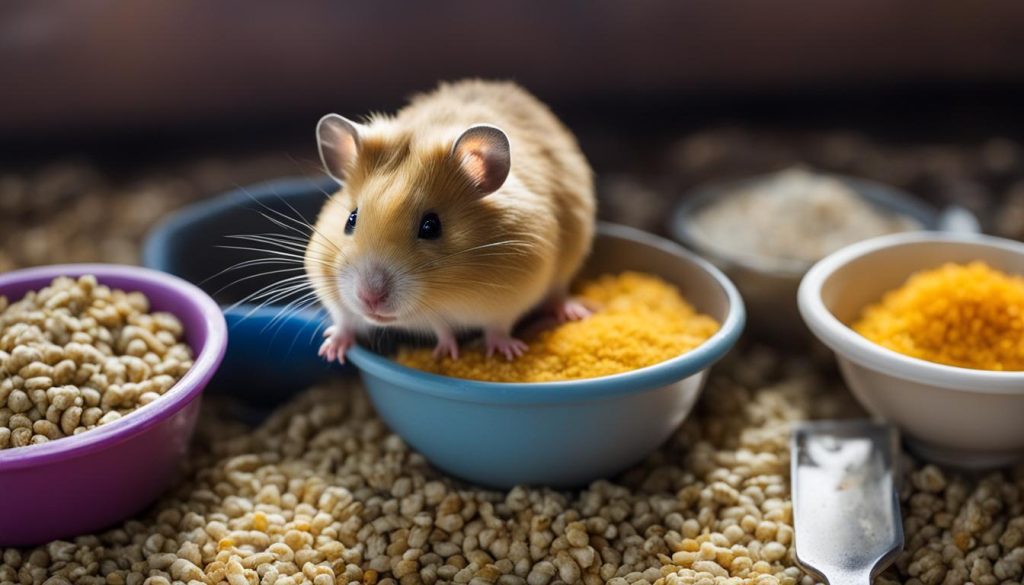
Recommended Diet for Hamsters
Hamsters should primarily be fed a quality commercial food that is specifically formulated for their nutritional needs. These commercial foods provide the right ratios of protein, grains, and other essential nutrients for a healthy immune system and body. It’s advisable to choose a hamster-specific commercial food, although some foods designed for gerbils can also be suitable.
In addition to commercial food, hamsters should receive fresh fruits and vegetables as daily treats. Small chunks of carrots, cucumber, celery, tomato, melon, bananas, oranges, and berries can be offered. These provide additional vitamins and minerals to supplement their diet. It’s important to ensure a balanced diet and not overfeed with fruits and vegetables, as they should make up only a small portion of their overall food intake.
Meat is not necessary for hamsters but can be given as an occasional treat. Fully cooked and cooled pieces of chicken, ham, or steak can be offered to provide additional protein. However, it’s important to keep in mind that protein should be sourced primarily from commercial hamster food to ensure the right balance of nutrients.
Feeding a healthy and well-rounded diet to hamsters is crucial for their overall health and well-being. It’s important to monitor their food intake and adjust the quantity accordingly to prevent overfeeding. Consulting with a veterinarian can provide additional guidance and ensure that the hamster’s diet meets their specific nutritional requirements.
Conclusion
After considering the dietary needs of hamsters and guinea pigs, it is clear that hamsters should not be regularly fed guinea pig food. While there may be some overlap in the types of vegetables and fruits that these small pets can eat, hamsters require specific nutrition to thrive. It is crucial to provide them with food mixtures made exclusively for hamsters, ensuring they receive the necessary nutrients for their overall health and well-being.
Hamsters have different dietary requirements compared to guinea pigs, with a higher need for protein. Feeding them guinea pig food regularly can result in nutrient deficiencies, leading to problems such as dry fur, lethargy, and muscle weakness. To support hamsters’ proper nutrition, a balanced diet that consists of quality commercial food formulated for hamsters and supplemented with fresh fruits and vegetables is recommended.
To ensure the best care for your hamster, consult a veterinarian for guidance on proper nutrition and feeding practices. They can provide valuable insights into the specific needs of your hamster and help you design a diet that meets their requirements. By providing the right food and proper nutrition, you can help your hamster thrive and lead a healthy and happy life.

